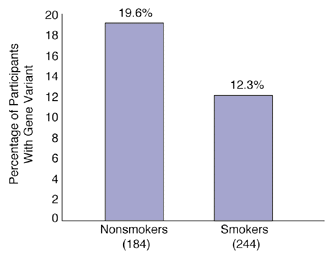 Percentages of Smokers and Nonsmokers With Gene Variant That Slows Nicotine Metabolism. Nonsmokers in a study at the University of Toronto were more likely than smokers to carry a copy of the CYP2A6 gene variant, which slows nicotine metabolism.
Percentages of Smokers and Nonsmokers With Gene Variant That Slows Nicotine Metabolism. Nonsmokers in a study at the University of Toronto were more likely than smokers to carry a copy of the CYP2A6 gene variant, which slows nicotine metabolism.A recent NIDA-funded study illustrates how genetic differences can contribute to or help protect individuals from drug addiction. The study shows that people with a gene variant in a particular enzyme metabolize or break down nicotine in the more slowly and are significantly less likely to become addicted to nicotine than people without the variant. In addition, people with the genetic variant who do become tobacco-dependent smoke fewer cigarettes than individuals without the variant, the study indicates.
"This study shows the importance of looking at the role of genetics in drug addiction and treatment," says Dr. Jonathan Pollock of NIDA's Division of Basic Research. Ultimately, increased knowledge about underlying genetic vulnerability might lead to more effective treatments for nicotine addiction that are tailored to particular types of smokers, Dr. Pollock says.
In the study, Dr. Edward Sellers and co-investigator Dr. Rachel Tyndale of the University of Toronto examined the role that a gene for an enzyme called CYP2A6 plays in nicotine dependence and smoking behavior. CYP2A6 metabolizes nicotine, the addictive substance in tobacco products. Three different gene types, or alleles, for CYP2A6 have been identified by previous research - one fully functional allele and two inactive or defective alleles. Each person has a paternal and maternal copy of the gene. Therefore, a person can have two active forms of the gene and normal nicotine metabolism; one active and one inactive copy and impaired nicotine metabolism; or two inactive copies, which would further impair nicotine metabolism.
The study found that people in a group who had tried smoking but had never become addicted to tobacco were much more likely than tobacco-dependent individuals in the study to carry one or two defective copies of the gene and have impaired nicotine metabolism. The researchers theorize that the unpleasant effects experienced by people learning to smoke, such as nausea and dizziness, last longer in people whose bodies break down nicotine more slowly. These longer lasting aversive effects would make it more difficult for new smokers to persist in smoking, thus protecting them from becoming addicted to nicotine.
"We have proven that the risk of becoming a smoker significantly decreases if you have one of the inactive alleles for this enzyme," Dr. Sellers says. Individuals who have two defective copies of the gene would have an even lower risk of becoming a smoker, he predicts. Although only 1 to 2 percent of the general population may carry two defective alleles, individuals with at least one defective allele constitute about 16 to 25 percent of the general population, Dr. Sellers says. "We've calculated that the frequency of defective alleles that we've found would be protecting about 7 million North Americans from becoming smokers," he says.
The study also found that individuals with impaired nicotine metabolism who do go on to become addicted to nicotine are afforded a measure of protection from the harmful effects of nicotine addiction. The study shows that smokers with at least one inactive allele smoked significantly fewer cigarettes daily and weekly than smokers with two active copies of the allele. Generally, smokers with slower nicotine metabolism do not need to smoke as many cigarettes to maintain constant blood and brain concentrations of nicotine, the researchers explain. However, this slower nicotine metabolism had a greater impact on reducing smoking among men than women in the study. This is probably because women's smoking is controlled less by nicotine dependence than is men's, the researchers suggest.
In addition to illustrating the role genetics can play in vulnerability to addiction, identification of the effect of the defective gene on smoking has prevention and treatment implications, Dr. Sellers says. "If you could find a chemical or some other way of causing the same effect, such as blocking the enzyme, you might be able to prevent people from becoming smokers," he says. "If you did the same kind of thing in people who were already smokers, they would be likely to smoke less, which could lead to smoking cessation," Dr. Sellers concludes.
Source
- Pianezza, M.L.; Sellers, E.M.; and Tyndale, R.F. Nicotine metabolism defect reduces smoking. Nature 393(6687):750, 1998.
